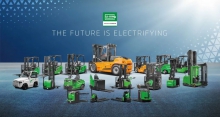Fuel Cell Forklifts Leading Hydrogen Push
2010-06-25 13:04 Kind:转载 Author:publicbroadcasting Source:publicbroadcasting
Statement:尊重合法版权,反对侵权盗版,若本网有部分文字、摄影作品等侵害了您的权益,在此深表歉意,请您立即将侵权链接及侵权信息邮件至我们的版权投诉邮箱:marketing@forkliftnet.com,我们会尽快与您联系并解决,谢谢您的配合.
ROCHESTER, NY (WXXI) - In the receiving bay of the Chili Wegmans a massive pile of wooden pallets is stacking ...
ROCHESTER, NY (WXXI) - In the receiving bay of the Chili Wegmans a massive pile of wooden pallets is stacking up. Workers have used what's called a "walkie reach" to move big cubes of cereal and boxes of ketchup bottles onto towering shelves. This electric lift truck - like the vast majority of the 1.7 million in America - is powered by rechargeable lead-acid batteries. They've been around for over a century.
But a number of companies, Wal-Mart and Wegmans among them, are beginning to switch to a new technology for their lifts: hydrogen fuel cells.
"Sexy" technology
"It's a sexy technology," says Andy Marsh, CEO of Plug Power. "[It] gets people excited. It's why you're here today."
Marsh's company, Plug Power, is the leader in making fuel cells for forklifts. The difference between a fuel cell and a battery is like the difference between a toy remote control car and a Honda: no recharging, just refilling. Marsh also says using the new lifts can reduce a warehouse's carbon footprint by up to 90 percent.
But managers are comfortable with the old style batteries, and fuel cells - while sexy - are expensive.
"That's one of the biggest challenges," Marsh says. "And that's where the U.S. government really has been helpful for us."
Since 2005 the federal government has offered a tax credit on fuel cells. But the credit doesn't apply to the forklift it's attached to. Earlier this month Sen. Charles Schumer proposed a bill that would change that. Marsh hopes it'll boost business - while also helping the economy.
"We're part of helping America become energy independent," Marsh says. "We're also helping with job creation. And the government wants to create taxpayers."
Plug Power's Marsh isn't the only one who thinks the high price tag for this burgeoning technology could use more federal help.
"Sticker shock"
"It's a significant factor," fuel cell expert Frank Devlin says of fuel cell costs. "That's why it's a bit of a sticker shock for a lot of the end users."
Devlin works for the Raymond Corporation. His company makes the lifts that run on Plug Power's fuel cells. He says lifts powered by hydrogen may be great, but until prices come down, adoption will be slow.
The cost of adopting was a big issue for Dave DeMascole. He runs the Wegmans distribution center in Pottsville, Pa.
"When we really looked at the math, and the finances involved, it worked out - even though the initial sticker didn't," DeMascole said.
That's because fuel cells are typically two to three times more expensive than batteries. But the math begins to work when you add in the federal subsidy, an impending rate hike for electricity, and a million dollar grant from the state of Pennsylvania to help with infrastructure costs.
DeMascole says he's happy with the new technology and Wegmans is planning to buy more fuel cell lifts and "pallet jacks" as the facility expands. But he understands why others in his position are hesitant to adopt the technology.
"It goes back to fear of the unknown," says DeMascole. "Jacks have been powered by batteries forever, and it works, and people are comfortable with it. So to completely abandon that and go to something else, there is a certain amount of fear."
But it's not fear holding back most companies, it's cost. And at the other Wegmans distribution center, here in Rochester, a spokeswoman says the battery-powered lifts are in fine working order and won't be switched out for fuel cells anytime soon.















 粤公网安备 44010602003952号
粤公网安备 44010602003952号